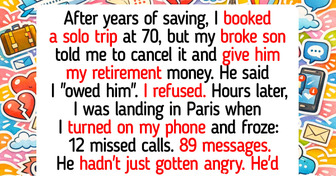He wants credit for things he didn’t accomplish, I suggest you set the record straight.
My Husband Humiliated Me on Our Wedding—Now I’m Questioning Our Future
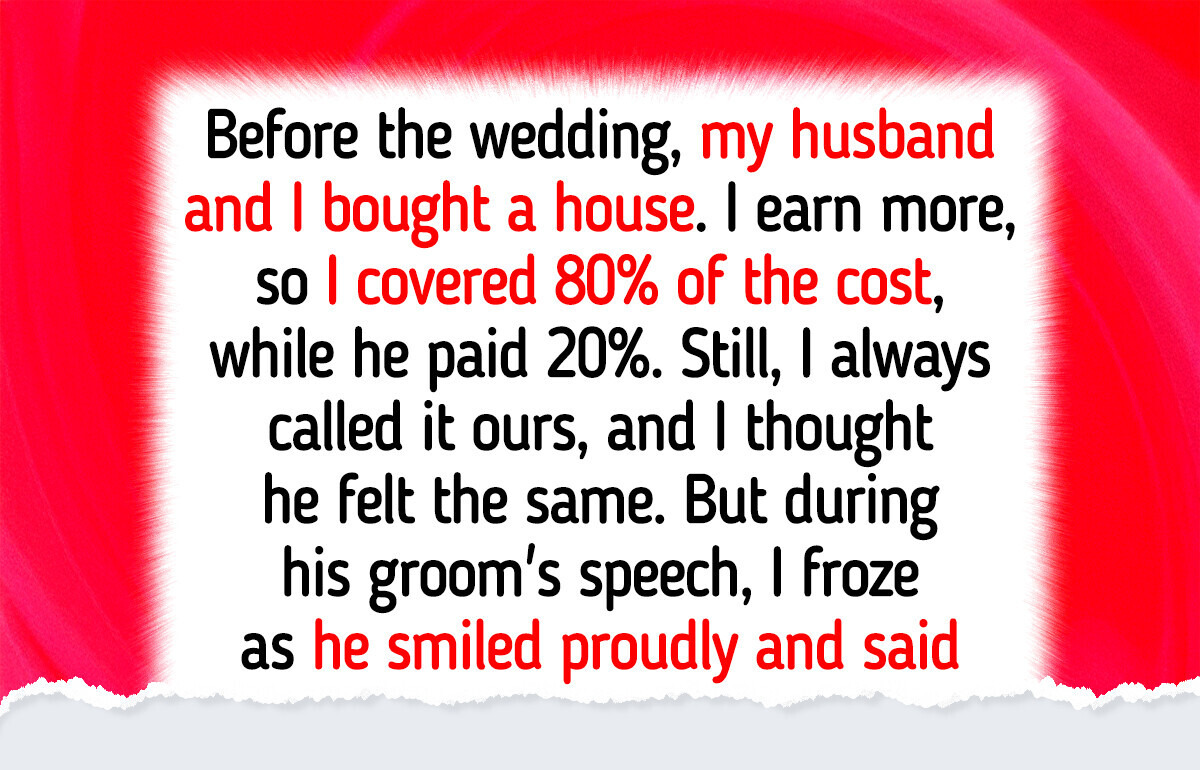
Hello, Bright Side,
I’m Kisha, 24 years old. I’ve been married a couple of weeks, but it feels like we’ve already stumbled upon our first crisis. Here is my story.
Before the wedding, my now husband and I bought a house. I earn more, so I covered 80% of the cost, while he paid 20%. Still, I always called it ours, and I thought he felt the same.
On the day of our wedding, everything was perfect until his groom’s speech. I froze as he smiled proudly and said, “I’m so happy to have finally bought us a house!” My jaw basically hit the floor while everyone clapped and cheered.
That night, I decided not to ruin our day and put off the conversation. A couple of days ago, I finally asked him why he said that. He shrugged and told me, “Well, it’s our house now, so why does it matter? People don’t need the math. It just felt good to say it.”
But it matters to me. I worked so hard for that. I skipped vacations and funneled almost all my savings into it. I said that it upsets me very much because I think it’s unfair not to acknowledge my input.
He got mad at me and said I was overthinking everything and turning it into a bigger issue than it was. We argued, and he started yelling that it was just nothing, but I was making this my hill to die on.
He stormed out and now ignores my calls. Am I wrong for being upset that he took full credit for the house in front of everyone?

For many if not most of us men we can't understand this because it is something we would never do to the woman we love. Personally I would be so proud of of my wife (and I am for so many things) for such an accomplishment with all the sacrifices made. This woman's husband is extremely insecure and will always try to steal her spotlight even if it means belittling or degrading her. They, especially him, need some serious counseling and the sooner the better. I only see heartache and eventual divorce if something isn't done soon.
Hi, Kisha, thank you for being open about your situation. You’re not wrong to feel upset. But instead of arguing over that speech, think of his pattern of response:
- He dismissed your feelings.
- He escalated to yelling.
- He avoids you afterward.
This is the real concern—because even if the house issue resolves, it’s hard to build a marriage on dismissal and stonewalling. So, we suggest you act from his point.
First, check how the house is registered. If the deed lists you both equally, but you paid 80%, you’re financially exposed in case of divorce, resale, or refinancing. Quietly talk to a property lawyer about whether you can document your larger contribution. This way, you could protect yourself against potential consequences later.
Second, don’t chase him. Send one calm message asking for a set time to talk. If he refuses or keeps avoiding, it signals that he’s unwilling to handle conflict in a marriage responsibly. That’s a red flag worth taking seriously.

When someone shows you who he is, BELIEVE HIM.
If he agrees to meet and talk:
- Shift the conversation away from the wedding speech itself.
Instead of repeating, “Why did you say that?”, frame it as: “When I raised a serious concern, you dismissed it and then ignored me. That can’t happen again.” This makes it about the way he handles conflict. - Test his willingness to acknowledge your effort.
Ask him directly to restate what you told him: “Can you explain back to me why this upset me?” If he refuses or minimizes again, you’ll know he isn’t just careless with words. He’s unwilling to take accountability. - Agree on how to present shared achievements in the future.
Make a simple rule: in public, both of you stick to “we” language unless you both agree on something else.
In the end, the house is only part of the issue. What matters most is whether he’s capable of respecting your contribution and handling conflict without shutting down. If he can’t do that now, this won’t be the last time you feel dismissed.
Conflicts like Kisha’s remind us how fragile trust can be. And it’s not just marriages—friendships can crack in the same way. In our next piece, 10 people share the exact moments when one choice, one word, or one action quickly turned lifelong friends into strangers.
Comments
I would get a home equity loan to pay his 20% back and get the marriage annulled. This is just the beginning. Anyone who loved you and was proud of your joint achievement would have said "We bought a house". Everything is about him and how he looks. It will not get better.
I understand all the criticism of this guy, it was a boorish move on his part. But, I want to play devils advocate here ... has anyone considered how rigid and unforgiving gender expectations are for men? Men are emasculated over splitting a check at dinner, let alone a house purchase. Women had an admirable activist movement dedicated to allowing them to break down gender norms and be who they want to be. We never had that... everything "manly" was made acceptable for women (or at least more acceptible) but no one ever did anything to make more "girly" roles socially acceptable for men. We are stuck with the expectation of being more athletic, aggressive and affluent, when that is no longer the reality. We are expected to appear to be the head of household, even though most of us split authority down the middle, even if we have SAHMs (as it should be). Perhaps if we took all that rigidity and expectation out of manhood, dudes wouldn't pull this kind of junk.
CHANGE THE LOCKS IMMEDIATELY. Then consult a property attorney and a divorce attorney. You may be able to get an annulment.
This is a big red flag. See a good lawyer and check your right now
Is his name Donald?
Related Reads
I Was Seconds Away From My Dream Job — Until HR Crossed a Legal Line

My Cousin Refuses to Pay Me After Singing for Her Entire Wedding
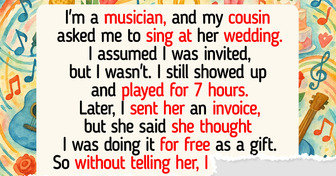
I Got Fired for Refusing to Let My Boss Humiliate Me in Front of Everyone
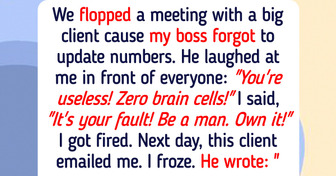
I Refused to Be Called the Office Villain by a Coworker Who Barely Works
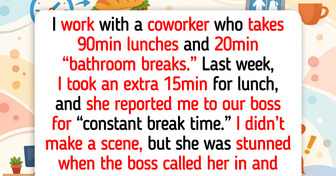
My Toxic Coworker Spread Lies About Me and Got Me Demoted—but I Got the Ultimate Victory

12 Moments Where Empathy Showed the Power of a Kind Heart

10 Moments That Prove Kindness Prevails Even in an Unfair World
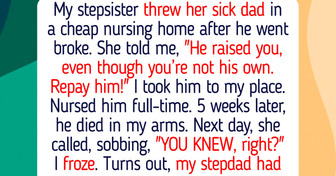
14 Friends Who Have a Black Belt in Creating Awkward Situations

10 Moments That Show Kindness Doing the Heavy Lifting
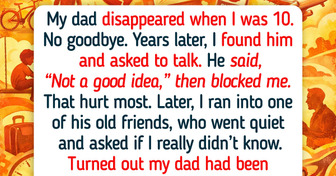
14 Quite Acts of Kindness That Changed Someone’s Life Forever

I Paid Half the Mortgage for Years—Then I Refused to Be Used Anymore
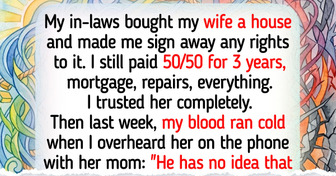
I Refuse to Give My Retirement Savings to My Adult Son—I’m Not Responsible for His Failures
